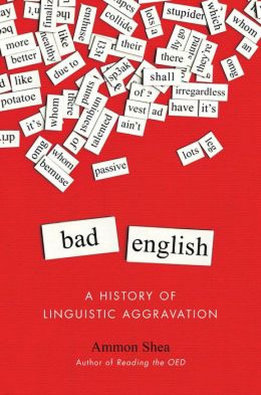 Written by Lauryn Smith Hopefully my review of Ammon Shea’s “Bad English” leaves no stone unturned, literally bemusing you because it ain’t boring irregardless of your interest in linguistics. Did anyone cringe at my depraved use of the English language in that opening sentence? Good. I intended that, and Shea was my inspiration. In his nonfiction book “Bad English,” Shea delineates the language's history, illustrating the worries, objections and complaints of grammarians throughout the ages. In doing so, he intentionally commits linguistic crimes and provides examples of historic and contemporary linguistic "mistakes," ultimately concluding that English is a hot mess but in the best way possible. Shea subtly yet successfully argues against those who take a prescriptive approach to English. He demonstrates that it is not necessary to fight over language. Instead, he shows that language is alive, that it is an interesting subject for study, debate and conversation. According to Shea, there is no right or wrong way to use English as every rule has evidence of being broken. Within the text, Shea presents both sides of the story, citing supporters and detractors of various of English’s canons. To clarify his points, he picks individual words and grammatical tendencies and follows their histories, explaining arguments and counterarguments surrounding their usage. He covers some expected terms, such as “hopefully,” “literally” and “irregardless,” but also less common ones, such as “very,” “donate” and “belittle.”
1 Comment
|

Enjoying my book reviews? If you’ve found them helpful or simply love diving into a good book, consider supporting my caffeine-fueled reading sessions! Your contribution helps keep the reviews coming and ensures I stay wide awake for those late-night reading marathons. Cheers to a shared love for literature! ☕️
Categories
All
|
